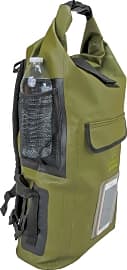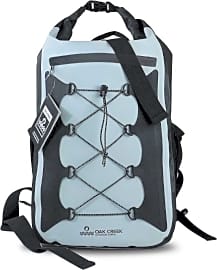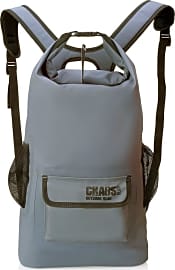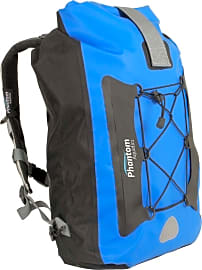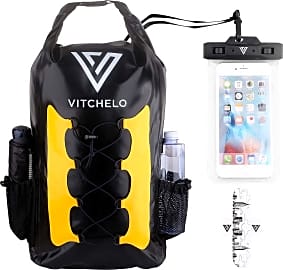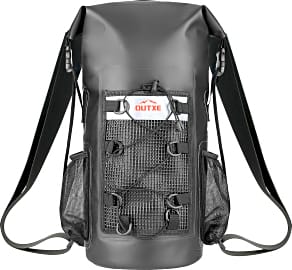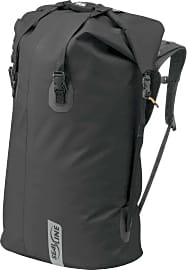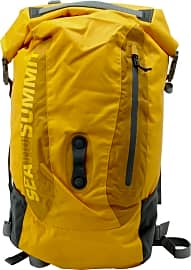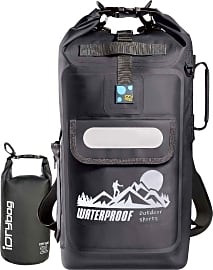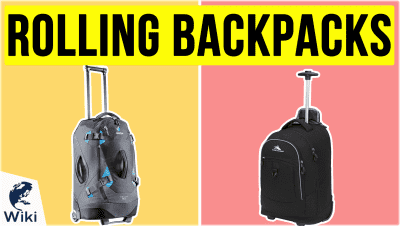The 10 Best Waterproof Backpacks

This wiki has been updated 35 times since it was first published in January of 2017. There are so many waterproof backpacks on the market that identifying the right one for your needs can prove challenging. But don't give up just yet. These options are guaranteed to shield your clothing, food, and everything else from the elements, and there are lots of styles to choose from. Plus, we've made sure to include models to suit budgets of all sizes. When users buy our independently chosen editorial recommendations, we may earn commissions to help fund the Wiki.
Editor's Notes
June 07, 2019:
When you pack for your next excursion, you may be tempted to use your regular backpack to haul everything. Don't make that mistake. A waterproof bag is essential if you want to make it more than a couple of hours in a wet environment. With plenty of pockets, straps, drawstrings, and other details, a waterproof backpack is absolutely essential if you want to keep your possessions safe while exploring the great outdoors.
The Ortlieb Velocity and Overboard Pro-Sport have been removed due to complaints concerning quality and availability, and the SealLine Boundary Pack was replaced with a new, updated version. The Relentless Recreation Splash Proof, Outxe Totally Sealed, and Vitchelo DB016 are the other new additions, chosen because of their thoughtful designs, durability, and overwhelmingly positive user reviews.
Special Honors
Mountain Hardwear Rainshadow The Rainshadow is designed to keep your things dry in even the wettest conditions. It boasts panels of quick-dry mesh along the back and shoulders and has plenty of easy-access pockets that make it possible to quickly retrieve supplies. It also has a thick belt to help distribute the weight of the load evenly across your body. rei.com
Panga 28 This one may be a bit more expensive than comparable products, but that's because it's just about as high-quality as a backpack can get. It has a roomy, duffel-style shape that can accommodate tons of gear, and its zipper is specially designed to create a waterproof seal, preventing moisture from creeping into the main compartment. yeti.com
Water Resistant Or Waterproof — There’s A Big Difference
A water-repellant backpack ups the ante in terms of protection, yet it still falls short in that you can’t feel fully confident submerging it in water.
When shopping for a waterproof backpack, you can expect to encounter claims detailing various levels of moisture protection — water-resistant, water-repellant, waterproof — which can easily lead to confusion and indecision if you’re not familiar with the terms.
By embarking on your search with a solid understanding of each claim, the whole process should go a lot more smoothly. Chiefly, you should know that when it comes to backpacks, waterproof means you can fully submerge it underwater without allowing any moisture inside. Anything less than this level of protection, and it’s not truly waterproof.
Unlike the waterproof designation, there is no clear-cut definition for the term water-resistant. Generally speaking, water-resistant backpacks feature durable materials, such as nylon or thick polyester, that will keep the contents of your bag dry to a certain extent when exposed to rain or liquid spills. Performance will vary among brands, but if you wear one of these for a prolonged period of time in a heavy downpour, your gear will eventually get wet.
A water-repellant backpack ups the ante in terms of protection, yet it still falls short in that you can’t feel fully confident submerging it in water. However, the fabric is usually treated with a special water-repelling laminate, and it typically has coated zippers that plug up any holes that could potentially permit water inside. These bags can handle heavy rains, bad spills, and potentially even a brief drop in the lake, as long as you make sure to haul it out of the water immediately.
To be clear — just because a backpack’s fabric is waterproof, that does not mean the backpack itself is waterproof. Producing a truly waterproof model is a daunting endeavor, as you must assemble the item in a way that creates absolutely no holes.
To do this, many companies weld fabrics together. These welded seams prevent water penetration of any kind, but they do create some limitations. This is why most waterproof models are simpler in design than traditional backpacks, with fewer compartments and ancillary features.
Most waterproof fabrics have a polyurethane coating or laminate, which adds a layer of resistance to the exterior. Remember, a polyurethane coating will not last forever, as exposure to moisture, excessive heat, and chemical contaminants will diminish its life. As long as you take care of your backpack and store it in a cool, dry, well-ventilated area, the coating can usually last upwards of 10 years.
Equipping Yourself For The Task At Hand
Once you’ve determined that you do indeed require a waterproof backpack, you should keep two primary factors in mind: your own personal style, and the activities you plan to participate in.
If you favor a traditional pack, with an exposed zipper on top for access to the main compartment, plenty of options are available in this style. Another popular design is the roll-top, which includes an additional fabric closure that wraps over the top zipper. Thanks to a handy cinch strap, you can keep the roll-top lid secured tightly at all times, whether you’re full to the brim or only carrying a few items.
For some outdoor activities, a waterproof backpack is nice to have; for others, it’s basically a necessity.
For some outdoor activities, a waterproof backpack is nice to have; for others, it’s basically a necessity. Most hikers will get by with a high-quality water-repellant model, but if you’re a true adventurer who prefers to take on day-long treks regardless of the weather conditions, your best bet would be to invest in a waterproof bag. The same goes for ambitious mountain bikers.
You don’t need a PhD in the outdoors to identify canoeing, kayaking, and white water rafting as obvious activities for which you should come prepared with one of these packs. The more time you spend on the water, the greater your chances of accidentally fully submerging your bag. Fishing is another prime candidate, especially if you tend to take trips that last a week or longer.
Depending on the length of your excursion, you’ll have to choose from a few different styles with varying capacities. Ideal for one to three nights, weekend packs can accommodate light gear, allowing you to remain agile on your feet. You’ll really need to maximize your use of space with one of these small models, however.
A multiday pack works well for three to five nights or long weekends that require a fairly substantial amount of gear. For longer outings, go with an extended-trip backpack, as these can usually handle up to 150 pounds of gear, including a tent for camping.
Go Big Or Go Home
If you’re looking to invest in a quality backpack that’s impervious to moisture, it’s reasonable to assume that you’re strongly committed to keeping your belongings dry and undamaged. Why not equip yourself with some additional waterproof gear, as well?
Unfortunately, it’s impossible to bottle up that scenery to enjoy at a later date.
One of the best things about immersing yourself in nature — whether you’re camping, fishing, kayaking, or hiking — is taking in your beautiful natural surroundings. Unfortunately, it’s impossible to bottle up that scenery to enjoy at a later date. What you can do is take plenty of photos, which is where a high-end waterproof camera will come in handy.
In terms of clothing, you’ll sure be glad you packed a bunch of waterproof apparel if Mother Nature isn’t on your side. Some heavy-duty rain gear can be the difference between continuing to enjoy yourself despite the weather or being forced to endure hours of misery, soaked to the bone and shivering.
Don’t overlook your first aid kit — in an emergency situation, it’s difficult to overstate the value of a set of waterproof matches, a pack of waterproof bandages, or some waterproof tape. You can never be too careful out in the wilderness.
You may say you’re going to ditch your smartphone when you head out into the woods, but let’s be honest — how many of us will actually follow through with that? Just in case you happen to get that itch to check your mobile device, it’s probably wise to invest in a nice waterproof cell phone case to ensure your device comes out intact at the end of the trip.


